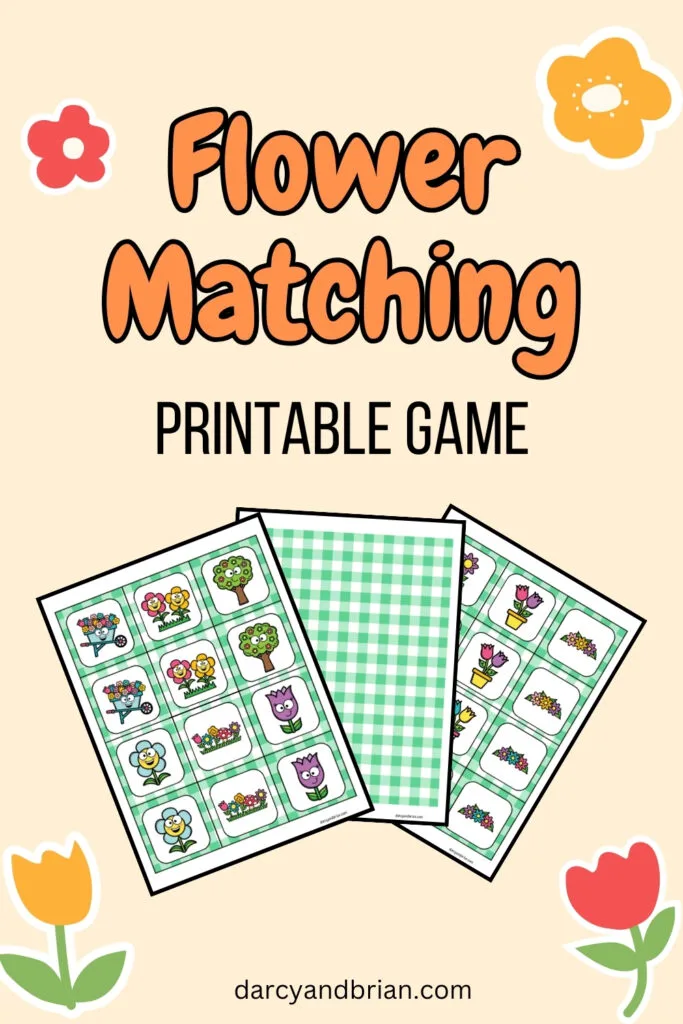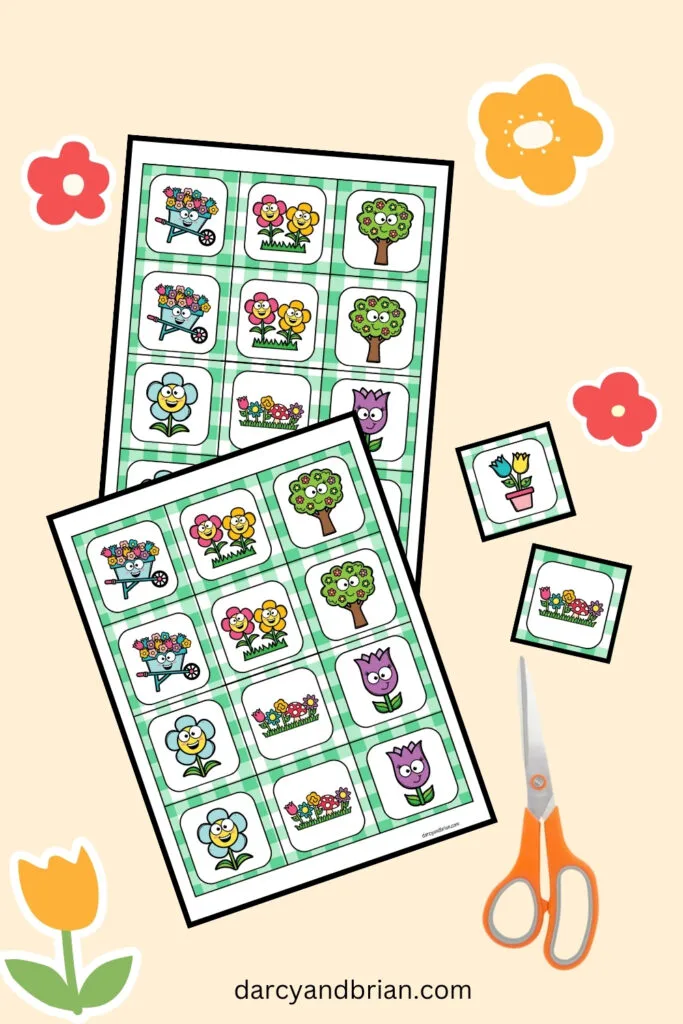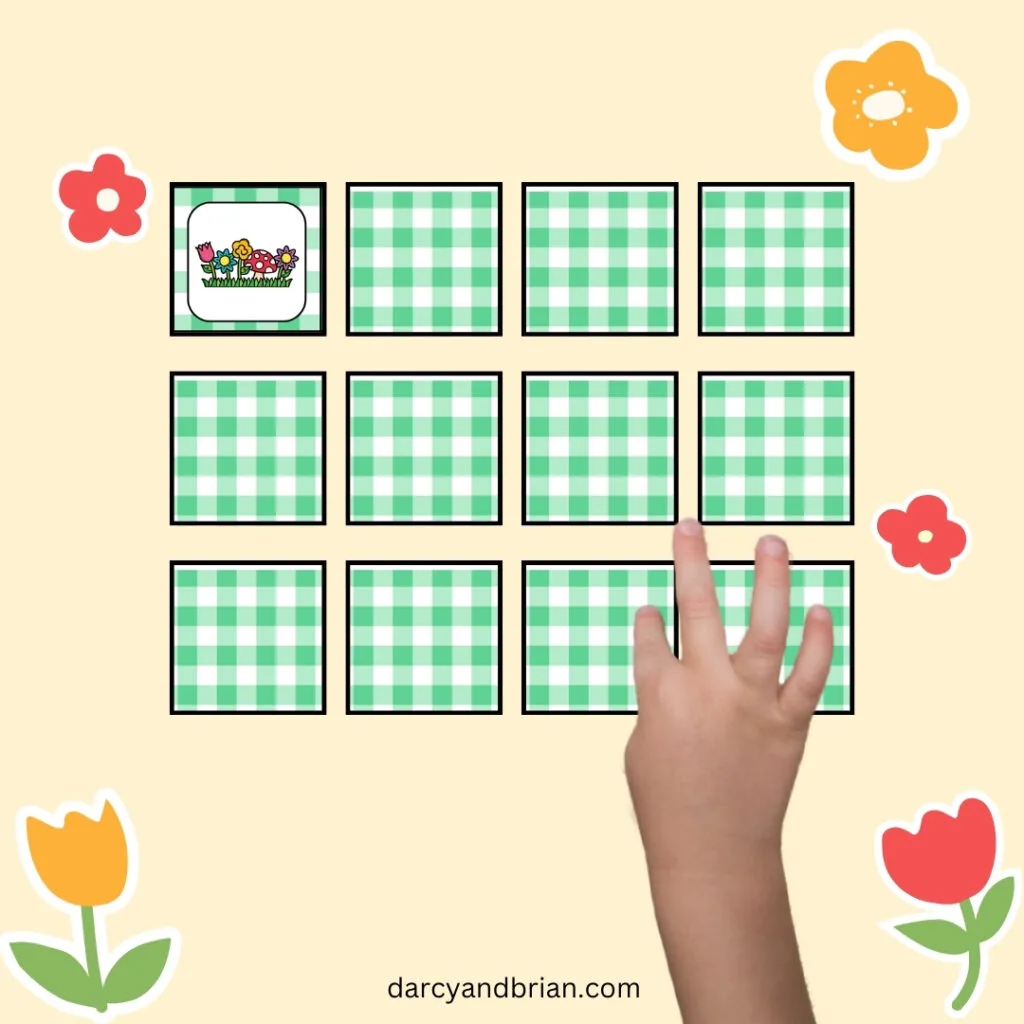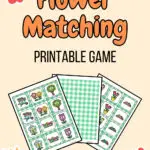Are you looking for easy spring activities for kids? This flower matching game printable is a fantastic choice that is fun and educational.
As spring blooms, bringing life and color back to our gardens and parks, kids will find the vivid colors and adorable illustrations engaging.
Plus, it sneakily boosts their learning through pattern recognition and memory skills. Ideal for both home and the classroom, this game is a hands-on, interactive celebration of the season.

What Ages Can Play Memory Match Games?
Memory match games are wonderfully adaptable, making them suitable for various ages. Toddlers -as young as two years old- can begin by matching pictures, which helps develop their observational skills and cognitive recognition.
These games serve a dual purpose for preschoolers, usually between the ages of three and five. They can work on matching items based on shape, color, or theme and challenge themselves to remember where specific pairs are located to complete a memory match successfully.
This engaging activity not only entertains but significantly contributes to their developmental milestones.
Benefits of Playing Matching Games
Playing matching games offers young children a unique combination of benefits that extend beyond mere fun. These activities enhance cognitive skills such as concentration, attention to detail, and memory retention.
Children also refine their problem-solving strategies by engaging in matching games, learning to observe patterns, and making connections. Such games foster visual recognition skills, which are critical for early literacy and numeracy, by encouraging children to notice similarities and differences among objects.
These games also promote emotional development by instilling a sense of achievement and boosting confidence as children successfully identify and pair matching items. This combination of educational and developmental benefits makes matching activities valuable in early childhood learning.
This post contains affiliate links. As an Amazon Associate and a participant in other affiliate programs, we earn a commission on qualifying purchases.
ABCaptain Counting Animal Matching Game with Sorting CupsOcean Adventure Memory Games for KidsSPARK INNOVATIONS Animal Matching CardsDisney Classic Characters Matching Game by Wonder ForgeHasbro Gaming Trucks Matching GameChuckle & Roar – Matching Game Alphabet – Board Game for Kids
Printable Matching Games
The convenience of printable matching games is (no pun intended) unmatched. They offer the distinct advantage of being ready to print and play, saving parents and educators the time and effort to create engaging activities from scratch.
This ease of access is especially useful when cards get lost or damaged; replacements are just a print away, ensuring the game can continue without interruption.
Our extensive collection of free printable games for preschoolers enhances this convenient and educational arsenal. These games are designed for fun and to aid in the developmental stages of young learners, offering even more options for interactive learning and play.
- Printable Spring Matching Game
- Color Matching Game
- Popsicle Matching Game
- Real Picture Matching Game
- Easter Memory Game Printable
What’s Included in the Flower Matching Game Printable?
The flower matching game printable includes 12 matching pairs of cards adorned with cute, colorful illustrations that will capture the hearts and imaginations of toddlers and preschoolers alike.
Children will delight in finding pairs of trees, wheelbarrows, potted flowers, and charming tulips with faces, among other spring-themed imagery.

To enhance the aesthetic appeal and add an element of surprise, the set also comes with a decorative sheet that can be printed and used to cover the back of each card. This aids in gameplay by concealing the illustrations on the reverse side, making it a true test of memory and attention.
Recommended Items For Printable Games
To get started, all you need is readily available at home or can be easily acquired. To access the Flower Matching Game PDF, fill out the form located near the end of this post.
For best results, print the game pieces on cardstock for immediate play. However, if you’re aiming for durability, consider printing on regular paper and using a laminating machine.
After printing, you can place the green plaid sheet over the back of the flower cards before laminating them to ensure they withstand frequent handling.
For those looking to print this and many other educational materials from the comfort of their home, we highly recommend an Epson EcoTank printer. It’s a fantastic choice for homeschooling families like ours, offering high-quality prints while saving money on ink.
Epson EcoTank ET-3830 Wireless Color All-in-One Cartridge-Free Supertank Printer Astrobrights/Neenah Bright White Cardstock, 8.5
Astrobrights/Neenah Bright White Cardstock, 8.5 Firbon A4 Paper Cutter 12 Inch Titanium Paper Trimmer Scrapbooking Tool
Firbon A4 Paper Cutter 12 Inch Titanium Paper Trimmer Scrapbooking Tool Classroom Timers for Teachers Kids Large Magnetic Digital Timer 2 Pack
Classroom Timers for Teachers Kids Large Magnetic Digital Timer 2 Pack 24PCS Sand Timer Assortment Plastic Sand Clock Timer
24PCS Sand Timer Assortment Plastic Sand Clock Timer Charles Leonard Dry Erase Lapboard Class Pack
Charles Leonard Dry Erase Lapboard Class Pack
How to Play the Flower Matching Game
Playing the Flower Matching Game is simple, enjoyable, and adapts to young learners’ evolving skills. Start by introducing the game to toddlers with only a few pairs facing up, allowing them to match the delightful floral cards easily.
This builds their confidence as they learn to match without feeling overwhelmed. Encourage taking turns to find a matching pair, enhancing social skills and patience. As their ability to recognize patterns and memorize locations improves, gradually increase the number of pairs.
For older children or as a memory challenge, start with a few pairs face down and slowly add more until you’re using all 12 pairs, always encouraging taking turns.
When a match is successful, they get another turn, adding excitement and rewarding their memory skills. This method keeps the game engaging, scales difficulty with the child’s developmental stage, and is perfect for growing minds.

What’s the Difference Between Memory Games and Matching Games?
While memory games and matching games center on identifying pairs, the key difference lies in their approach to challenging the player’s cognitive skills.
Memory games require players to flip over cards that are placed face down and remember the location of each card to match pairs, thereby testing and improving their short-term memory and recall abilities.
On the other hand, matching games may present all items face up from the start, focusing more on the player’s ability to recognize and pair similar items based on visual cues without the added challenge of remembering their locations.
This fundamental difference highlights memory games’ focus on enhancing memory skills, whereas matching games concentrate on pattern recognition and categorization.
Engaging Spring Preschool Activities
Spring offers a perfect theme for preschool lessons, bursting with opportunities for exploration and learning. Enhance your curriculum by incorporating a range of seasonal activities.
Young learners can work on early math skills with our Roll and Color Spring Dice Game or have a blast acting out various Spring Charades prompts. Storytime can feature books about plants, animals waking from hibernation, and the importance of rain for Earth’s rejuvenation.
From planting seeds in a classroom garden to exploring the science of how plants grow, these activities enrich the learning experience and foster a deeper connection with nature and an understanding of the world’s cycles.
Engaging in arts and crafts, such as creating coffee filter butterflies or vibrant Truffula tree crafts for preschoolers, offers endless opportunities to blend education with enjoyment. These activities form a cohesive spring unit, perfectly pairing with the matching flowers game.
Flower Books for Preschoolers
Reading and looking through flower picture books with preschoolers opens up a colorful world of learning and exploration.
It’s a cozy and interactive way to introduce young learners to the diverse beauty of nature, helping them understand the cycle of growth and the importance of flora in our environment.
Up in the Garden and Down in the Dirt: (Nature Book for Kids, Gardening and Vegetable Planting, Outdoor Nature Book) (Over and Under) I Can Grow a Flower (Life Cycle Board Books)
I Can Grow a Flower (Life Cycle Board Books) Lola Plants a Garden (Lola Reads)
Lola Plants a Garden (Lola Reads) Mrs. Peanuckle’s Flower Alphabet (Mrs. Peanuckle’s Alphabet)
Mrs. Peanuckle’s Flower Alphabet (Mrs. Peanuckle’s Alphabet) National Geographic Readers: Seed to Plant
National Geographic Readers: Seed to Plant The Tiny Seed: With seeded paper to grow your own flowers! (The World of Eric Carle)
The Tiny Seed: With seeded paper to grow your own flowers! (The World of Eric Carle)
Picture books with vibrant illustrations captivate children’s imaginations, fostering a love of reading and an early appreciation for the natural world.
This shared activity not only enriches their vocabulary with the names and types of flowers but also nurtures a bond over shared discoveries and the simple joys found within the pages of a book.
Fun Flower Crafts for Preschoolers
Crafting presents an excellent extension activity for preschoolers. It encourages creativity and fine motor skill development and offers a tactile experience with the subject matter.
Craft projects allow children to explore colors, shapes, and textures, reinforcing their learning about flowers and nature in a fun, hands-on environment.
- Felt Flower Bookmark Craft
- Paint Sample Flower Craft
- Paper Plate Sunflower Craft
- Flower Handprint Card
- Soda Bottle Flower Print Craft
In spring, engaging preschoolers with activities like the Flower Matching Game both educates and entertains, mixing learning with the beauty of nature. Through vibrant flower crafts and flower-themed picture books, these resources help foster a love for the natural world.
The printable game, along with selected activities and reading suggestions, provides a well-rounded approach to spring education that’s both meaningful and memorable.
It encourages young minds to connect with nature, boost their cognitive skills, and express their creativity, planting the seeds for a lifelong love of learning.

Darcy is the founder of “Life With Darcy and Brian,” where she combines her love for education, board games, and crafting to create engaging learning experiences for kids. Her creative projects and writing have been featured in outlets like The Toy Insider, CafeMom, Mom.com, Parents.com, Country Living, and The Pioneer Woman.



















